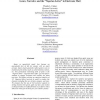Free Online Productivity Tools
i2Speak
i2Symbol
i2OCR
iTex2Img
iWeb2Print
iWeb2Shot
i2Type
iPdf2Split
iPdf2Merge
i2Bopomofo
i2Arabic
i2Style
i2Image
i2PDF
iLatex2Rtf
Sci2ools
HICSS
2007
IEEE
2007
IEEE
Genre, Narrative and the "Nigerian Letter" in Electronic Mail
Spam, or unsolicited email, has become an unavoidable fact of life for anyone with an email account. Spam emails generally reflect genres seen in traditional print format such as advertisements, memos, etc. One particularly interesting form of spam is the “Nigerian letter”. Nigerian letters offer “get rich quick” schemes to engage recipients into advance fee fraud activities. This paper provides an empirical analysis of 111 Nigerian letters received by email to explore key elements including the use of form, purpose, and tone. We propose that the use of rich narrative appeals to strong emotions like greed, guilt and lust, and invokes archetypal myths of windfall fortunes in an effort to illicit behaviors which, for the most part, are counter- factual.
Biometrics | Get Rich Quick | HICSS 2007 | Nigerian Letters | Rich Narrative Appeals | System Sciences |
| Added | 02 Jun 2010 |
| Updated | 02 Jun 2010 |
| Type | Conference |
| Year | 2007 |
| Where | HICSS |
| Authors | Wendy L. Cukier, Eva J. Nesselroth, Susan Cody |
Comments (0)

